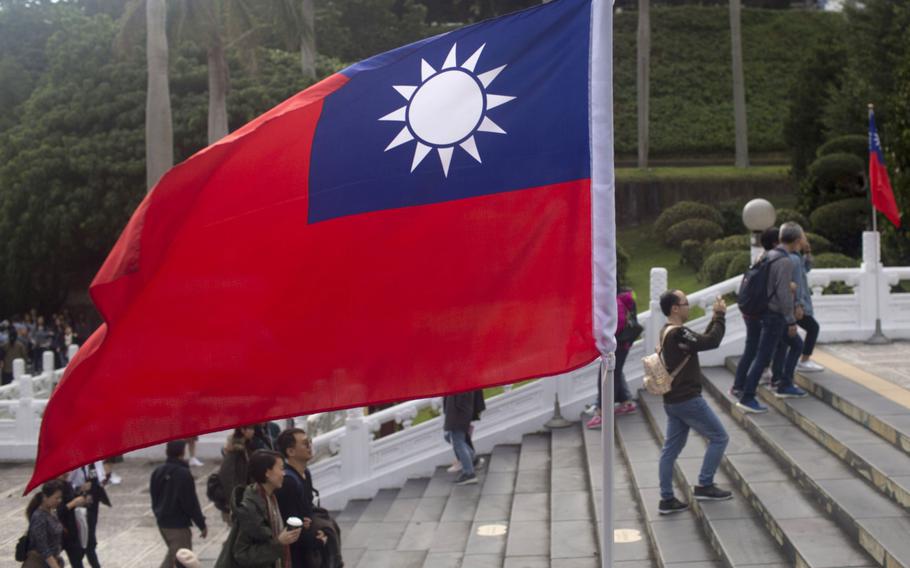
A Taiwan flag stands at the National Palace Museum in Taipei, Taiwan, on Dec. 29, 2017. MUST CREDIT: Bloomberg photo by Brent Lewin. (Brent Lewin)
China said it will punish businesses and political donors with links to individuals supporting Taiwan independence after it fined Taiwanese conglomerate Far Eastern Group.
“Businesses and financial sponsors associated with supporters of Taiwan independence will be penalized according to law,” Taiwan Affairs Office spokeswoman Zhu Fenglian told reporters on Monday, according to a statement from her agency. Zhu said that backers of independence undermine cross-strait relations and risk instability in the region.
Zhu made the remark as she responded to a question about whether the punishment Far Eastern received earlier Monday was connected to China’s efforts to sanction Taiwanese politicians who support independence from the mainland. While Zhu didn’t directly characterize Far Eastern as an associate of pro-independence politicians, she warned that China will never allow individuals and businesses with such views to make profits in China.
The remarks threaten to spook companies with any links to Taiwanese President Tsai Ing-wen and her pro-independence Democratic Progressive Party. Beijing has continuously ratcheted up military, economic and diplomatic pressure on democratically run Taiwan Tsai’s election victory in 2016, moves that have only increased her popularity.
Taiwan strongly condemns China interfering with the operations of Taiwanese businesses and Taiwan’s democratic system, Taiwan’s Mainland Affairs Council Deputy Minister Chiu Chui-Cheng said in a text message on Tuesday.
“Taiwan will consider taking necessary counter measures at an appropriate time to protect national security and the interests of Taiwanese people,” Chiu said.
Tsai’s government views Taiwan as an already de facto sovereign nation, although it has stopped short of pushing for a formal independence declaration -- a clear red line from Beijing that could trigger an invasion. China has sought to raise the costs for Taiwan’s 24 million residents to support Tsai’s party, with little success: She won the presidential election in 2020 by nearly 20 percentage points, gaining the highest vote share ever for a DPP candidate.
“The current sanction is restricted to Far Eastern Group, and its magnitude does not seem overly costly,” said Yongwook Ryu, assistant professor of East Asian international relations at the National University of Singapore’s Lee Kuan Yew School of Public Policy. “But what is important is its signaling effect both to foreign and Taiwanese businesses as well as to the Chinese public that the Chinese government shall not tolerate any bit of Taiwanese independence movement or support.”
Far Eastern, which has businesses across a range of sectors, has donated to both the DPP and the China-friendly opposition Kuomintang. The company gave about $2 million to Tsai’s party in the run-up to the January 2020 legislative elections, making it the DPP’s biggest donor, according to Taipei-based Wealth Magazine, which cited statistics posted online by the Taiwanese government.
Tsai Lien-sheng, secretary general at Taiwan’s Chinese National Federation of Industries, said it was inappropriate for China to link legal matters with politics and said the episode could be worrisome for Taiwanese businesspeople.
“Far Eastern has made donations to not only DPP but also to the KMT and other parties,” he said. “This is what it has to do but it doesn’t necessarily mean it supports Taiwan independence.”
In early November, China hit three top Taiwanese politicians with what it said were punishments that could be followed by criminal prosecution, as Beijing seeks to retaliate against Taipei’s overtures for greater international support.
Premier Su Tseng-chang, Foreign Minister Joseph Wu, speaker of the Legislative Yuan, or parliament, You Si-kun, and their relatives are all banned from entering the mainland, Hong Kong and Macau. The three -- and any entities affiliated with them -- are also prohibited from working with mainland-based organizations and individuals, while companies linked to them are barred from making profits there.
The Communist Party-owned Global Times newspaper claimed Far Eastern had offered financial assistance to Su, who it called a “diehard Taiwan secessionist.”
A number of Far Eastern subsidiaries in China were fined after they were found to be violating laws and regulations, the official Xinhua News Agency reported, though the figure was not disclosed. It cited alleged violations by the group’s textile and cement ventures in environmental protection, land use, employees’ health, safe production, tax payment and product quality.
The two subsidiaries affected, Asia Cement Corp. and Far Eastern New Century Corp., were fined a total of 88.6 million yuan ($13.9 million), according to separate statements from the companies. Both said their operations in China weren’t impacted in a major way.
Representatives from the two firms said they didn’t have anything to add to their statements. Asia Cement retreated 1.3% at the close, while Far Eastern New Century lost 1.4%.
The fines on Far Eastern companies are more “targeted and precise” moves,” Liu Guoshen, director of the Taiwan Research Institute at Xiamen University in China across the strait. A company, he added, should not be allowed to “make money on the mainland while at the same time hurt people’s feelings.”
Bloomberg’s Fran Wang, Jing Li, Jenni Marsh, Samson Ellis and Cindy Wang contributed to this report.